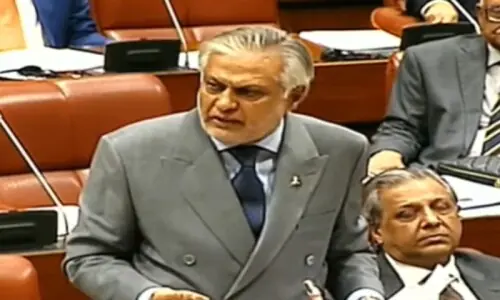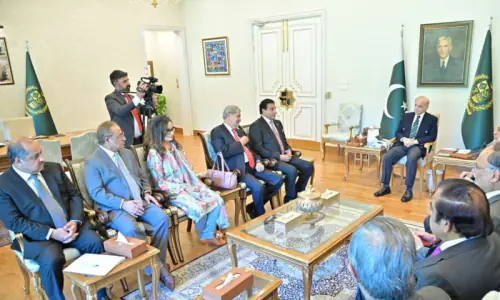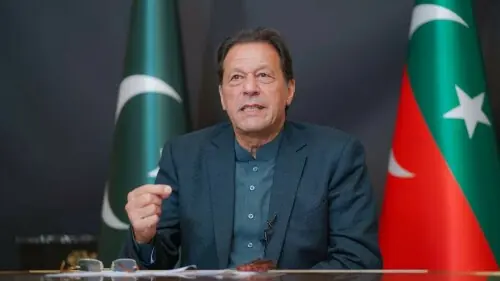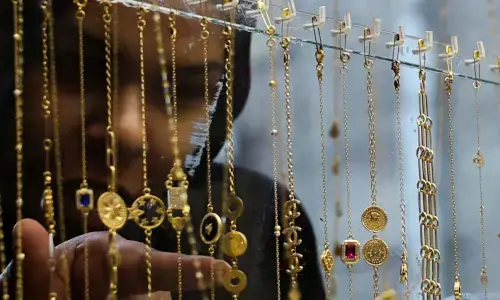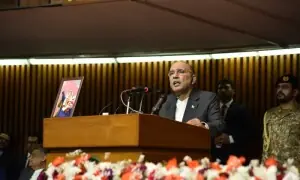Charles Dickens would probably not object to my stealing his line; 'Those were the best of days, those were the worst of days' if he knew my reference to context the golden era of PTV drama.
Many of us still remember the glory days of Khuda Ki Basti, Ashfaq Ahmed's Aik Mohabbat Sau Afsanay, Mustansar Hussain Tarar's Aik Haqeeqat Sau Afsanay, Amjad Islam Amjad's Waaris, Samandar, Drama '82, '83, '85 and so on; Jhok Sial, Parchaaiyan, Qurbatein Aur Faaslay, Shehzori, Kiran Kahani, Zer Zabar Pesh, Uncle Urfi, Shama, Ana, Ankahi, Tanhaiyaan, Kashkol, Dhund, Dhoop Kinaray, Tota Kahani, Sitara Aur Mehrunnisa, Jungle, Deewarein, and PTV Quetta centre's Dhuaan among many other long and short plays and serials.
As clichéd as it may sound, people used to plan their domestic chores and social events around PTV primetime till not very long ago. The characters haunted us, the plots hypnotised us and we were proud of Pakistani drama which left audiences across the border in awe. The state ruled PTV (it still does) and PTV in turn ruled our lives.
Genesis
In the beginning there was black-and-white TV and Khalid Saeed Butt, Farooq Zameer, Mehmood Khan Moodi and Mohammed Qavi Khan appeared in visually strong plays such as Aik Khel, Aik Fankar. They were refined individuals and intellectuals, hence the works they produced were splendid adaptations of novels and plays from both Urdu and English literature. Later, Saleem Nasir (late), Talat Husain, Subhani Bayounus (late), Arshe Muneer (late), Hameed Wyne and others from Karachi joined the bandwagon, adding further strength to the art of drama.
Pakistani audiences back then were fed a staple diet of Dr Enwar Sajjad, Ashfaq Ahmed, Munoo Bhai, Bano Qudsia, Mohammed Nisar Husain, Amjad Islam Amjad, Mustansar Husain Tarrar, Kuwar Aftab, Yawar Hayat, Haseena Moin, Shahzad Khalil, Sahira Kazmi and Mohsin Ali just a few of the stalwarts responsible for the incredibly beautiful plays and serials throughout the late '70s and '80s, even right up till the '90s.
The original Khuda Ki Basti (recently remade for the small screen by actor-director Rashid Sami) had a stellar caste of mainly radio artistes such as Qazi Wajid, Zahoor Ahmed (late), Zaheen Tahira, Zafar Masood (late) and Behroze Sabzwari, the latter to the best of my knowledge then a debutante. In those days PTV cashed in on a team of enthusiastic talent from Radio Pakistan which served as an academy for many years to come. Little did anyone know then that the institution was to produce the finest actors known to Pakistan, for Radio Pakistan had instilled in them good diction and voice delivery that is now difficult to master for newer performers.
Unlike the modern trend of models opting for TV careers as hosts, anchors and actors, Babra Sharif was the only one to be picked from a washing powder commercial in 1974 for a PTV play in those days. She soon opted for the greener pastures of Lollywood and the rest, as they say, is history.
Actors like Azmul Haq, Tauqir Nasir, Mohammed Qavi Khan, Jameel Fakhri, Arifa Siddiqi, Rubina Ashraf, Khalida Riyasat, Roohi Bano, Uzma Gillani, Nayyar Kamal, Khalida Riyasat, Sarwat Attiq, Attiya Sharf, Sheeba Butt, Begum Khurshid Shahid and Azra Sherwani are a few random names that come to mind as actors par excellence who have become immortal with the passage of time.
The entire nation synchronised their lives to shows like Baseerat, children's shows, cartoons, regional fare and the pre- and post-Khabarnama prime-time slot, all the while staying glued to their TV sets. They could be called bad days in terms of quantity as compared to now but quality was definitely the order of the day. Moreover, storylines in the past were not marginalised like today's limited plots that perpetually focus on extra-marital affairs, transvestites and tawaifs/prostitutes in the backdrop of designer costumes, glamourous art-deco sets or a couple of grand havelis that pop up in every other serial to showcase affluent lifestyles bordering on decadence.
Whether it was a monopoly of a few talented writers, producers, directors and actors or the fact that with one channel we weren't really spoilt for choice, those were times when oblivion was bliss and exposure to international programmes was at a bare minimum. PTV benefitted immensely from this and the everlasting appeal of its plays of yesteryears is still very much alive to date. Any Haseena Moin serial from Shehzori to Bandish to Dhoop Kinaray can be watched and enjoyed time and time again courtesy the many CD shops, or Karachi's Rainbow Centre that sells entire volumes and collections of Samandar, Waris, Ankahi, Uncle Urfi, as well as the Sahira-Rahat Kazmi starrer Parchaiyaan and Doosra Aadmi, all of which enjoy a timeless appeal.
Speaking from personal experience, I have watched Ashfaq Ahmad's Tota Kahani, Aik Mohabbat Sau Afsaney, Aik Haqeeqat Sau Afsanay and the legendary long plays of Drama '83 (and of the following years) umpteenth times to the extent that the plot, dialogues and each and every character have been etched on my mind. Those lined up for a must-watch on my playlist now include Dada Dildada, Cinderella Aur Sakina, Quratul Ain, Sanam Gazeeda, Zood-i-Pasheman, Ajar-i-Aswad and Mama Seemi. Ashfaq Ahmed's wife and a much sought after playwright in her own right, Bano Qudsia's Fehmida Ki Kahani Ustani Rahat Ki Zabani is also unforgettable and a yardstick to measure any future endeavours in drama writing, production and histrionics.
Eid transmission, especially the primetime play, generated a lot of excitement both before and after the play was aired. Haseena Moin's Happy Eid Mubarak where Nilofer Aleem played the title role became so popular that it was shown on not one but many eids after that, and people loved watching it every time.
These stories would centre round life's vicissitudes, characters from all walks of life, and lines that would be impregnated with philosophy and meaning that would permeate the heart, mind and soul of any viewer. The leanings of modern society depicted through strong characterisation and brilliant histrionics would be handled deftly, and the end would portray a transfer of ideas and thoughts from the elderly to the younger, confused set. A complex of generation-gap issues were handled in a most thought-provoking manner, something specially characteristic of Ashfaq Ahmed's plays.
The writers then focusing towards societal reforms wrote passionately, addressing the ills of society through their plays. In Fehmida Ki Kahani Ustani Rahat Ki Zabani, Begum Khurshid Shahid and Faiza Hasan breathed life into the characters of an impoverished mother and daughter, respectively, with their brilliant acting talent. The story centred around a lower-class struggling mother working hard to make a living and collect a dowry for her daughter who is fighting a personal battle of conflict after witnessing a vulgar display of wealth.
The sad knowledge that there is enough material on archives that should be re-telecast and that the PTV authorities choose to turn a blind eye towards this treasure trove is heart-rending to say the least. What could be done is to start an off-shoot channel by the name of PTV Gold or PTV Classic devoted to this fine fare from the past that enjoys a devoted viewership.
Today, our television programming borders on the mediocre to very average, and this ill has permeated all levels of production. For lack of better work we celebrate our mediocrity and insist on calling it brilliant, whereas in actuality we are in dire need of newer, fresher stories along with writers, actors and directors who have a fire burning within their souls. A single play like Veena or the likes of Samira Fazal, Mehreen Jabbar and Hina Dilpazeer Khan just isn't enough.










